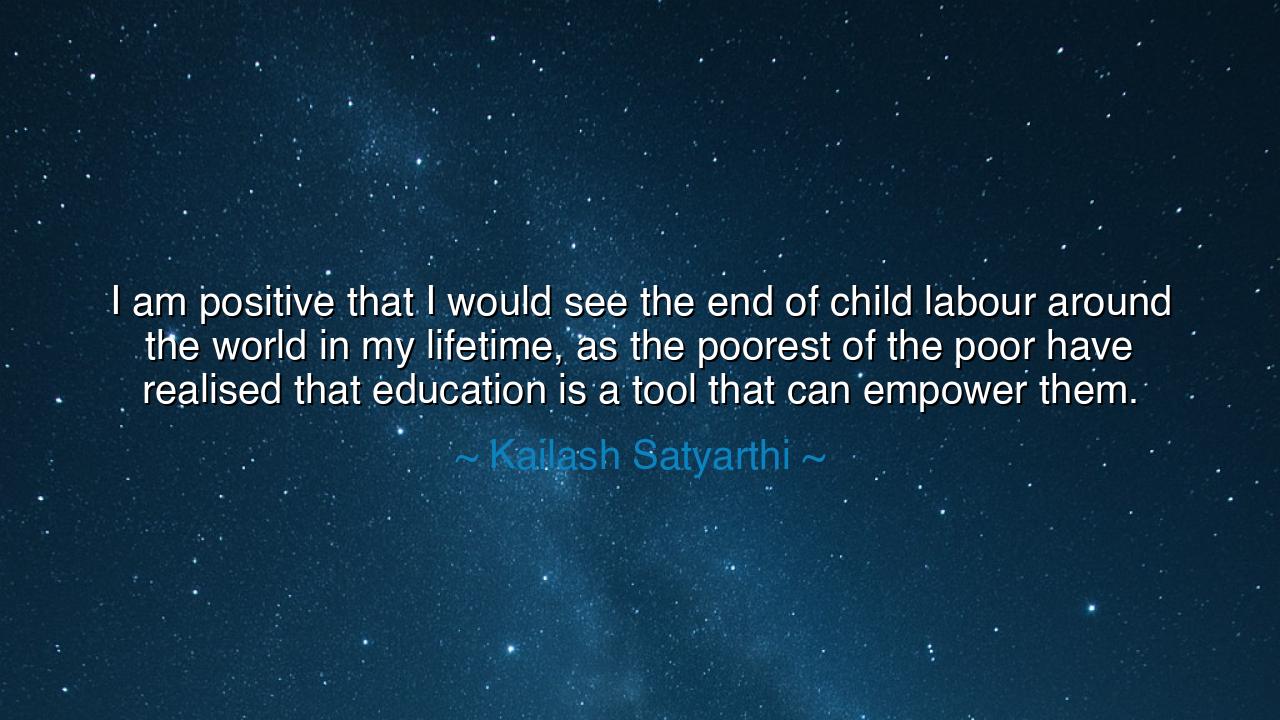
I am positive that I would see the end of child labour around the
I am positive that I would see the end of child labour around the world in my lifetime, as the poorest of the poor have realised that education is a tool that can empower them.






“I am positive that I would see the end of child labour around the world in my lifetime, as the poorest of the poor have realised that education is a tool that can empower them.” – Kailash Satyarthi
In these radiant and hopeful words, Kailash Satyarthi, the Nobel Peace Prize laureate and tireless crusader for children’s rights, reveals a truth both moral and eternal: that education is the light that dispels the darkness of bondage. His declaration is not born of naïve optimism but of a lifetime spent walking among the broken and the brave—the children who have toiled in sweatshops, mines, and fields, and the parents who, in despair, traded their children’s future for survival. Satyarthi’s words rise like a prayer and a prophecy: that the chains of child labour will one day be shattered, not merely by law, but by enlightenment—by the realization that education is liberation.
The meaning of this quote lies in the transformation of awareness. Satyarthi understands that poverty is not only the absence of wealth—it is the absence of opportunity. For generations, the poor have been ensnared in a cruel cycle: without education, they cannot rise; without rising, they cannot afford education. Yet he has witnessed a miracle—when the poor discover that schooling is not a luxury but a weapon against oppression, the walls of hopelessness begin to crumble. Education gives voice to the voiceless, power to the powerless, and vision to those once blind to their own potential. It is the alchemy that turns suffering into strength.
The origin of this conviction comes from Satyarthi’s own journey. Born in a small town in India, he gave up a promising career as an engineer to dedicate his life to freeing children from slavery and exploitation. In 1980, he founded the Bachpan Bachao Andolan—the “Save the Childhood Movement”—which rescued tens of thousands of children from bonded labour and restored them to classrooms. Through these experiences, Satyarthi learned that the greatest change does not come from rescuing a single child, but from transforming the mindset of communities. When a poor mother, who once believed her daughter must work to survive, sees that education can lift her entire family from poverty, she becomes the fiercest defender of her child’s future. Thus, education becomes more than knowledge—it becomes power awakened.
History, too, confirms this truth. In the early 19th century, during the height of the Industrial Revolution, children in Britain worked in coal mines and factories for endless hours. They were small enough to crawl under machines, but their innocence was ground into dust. Reformers such as Lord Shaftesbury and Robert Owen rose to challenge this cruelty, advocating for both labour laws and education for the poor. It was only when education became compulsory that the chains of child labour began to break. Satyarthi’s mission stands in this same lineage of human progress: the belief that the classroom is the battlefield where poverty is conquered and justice is won.
Yet Satyarthi’s words are not merely historical—they are prophetic. He speaks of a time when the world’s poorest will no longer see their children as labourers, but as learners, as bearers of hope. His optimism is not blind faith; it is born of the countless stories he has lived. A child who once stitched carpets in a dark room now teaches mathematics to others. A girl who once carried bricks now studies to become a doctor. Such transformations are not miracles—they are the inevitable fruits of education, the living proof that when knowledge enters a mind, freedom enters a soul.
At its heart, this quote is also a call to moral leadership. Satyarthi reminds us that the end of child labour will not come from governments or organizations alone—it will come from the awakening of collective conscience. Every teacher who reaches a forgotten village, every consumer who demands ethical products, every citizen who refuses to turn away from suffering, becomes part of the great uprising of compassion. To educate one child is to strike a blow against injustice; to educate a generation is to reshape the destiny of humanity itself.
The lesson of Satyarthi’s words is clear and stirring: if we wish to end suffering, we must begin with the mind. Give a child a book instead of a burden, and you have already begun to change the world. Do not underestimate the power of a single act of compassion, for education multiplies its miracles in silence. As Kailash Satyarthi teaches, the war against child labour is not only a struggle for rights—it is a spiritual revolution, a reclaiming of humanity’s own conscience.
Therefore, let his words resound as both promise and command: believe in the power of education, and act upon it. For when the poorest of the poor understand that knowledge is not a privilege but their birthright, the last chain will break, and a new dawn will rise—a world where every child, freed from toil and fear, walks into the light of learning, carrying within them the future of humankind.






AAdministratorAdministrator
Welcome, honored guests. Please leave a comment, we will respond soon